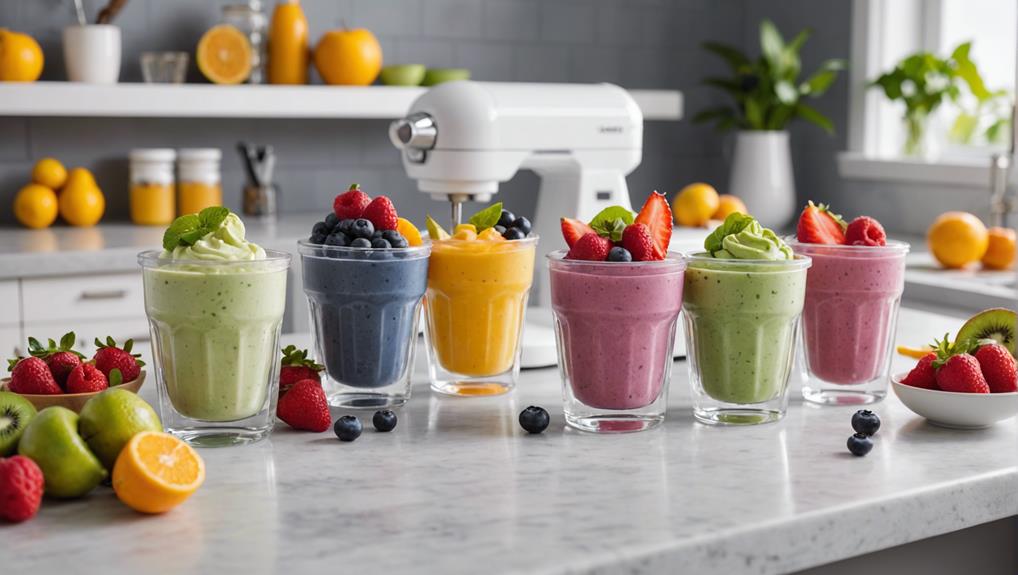Creating delicious, nutrient-dense vegan frozen yogurt for kids is a wholesome and easy way to satisfy their sweet tooth. Use plant-based yogurts like coconut or almond for a creamy base, combined with fresh fruits and natural sweeteners like maple syrup. This mixture can be spread on a parchment-lined baking sheet and topped with kids' favorites, from nuts to vegan chocolate chips. Freeze until solid and enjoy a treat rich in vitamins, minerals, and probiotics. Proper storage preserves quality and nutritional value for up to three months. To learn more about enhancing flavors and nutritional profiles, explore further.
Key Takeaways
- Blend plant-based yogurt with fresh fruits and natural sweeteners, then freeze until solid.
- Kids can choose and sprinkle favorite toppings before freezing the yogurt mixture.
- Use airtight containers and proper storage methods to maintain freshness and texture.
- Experiment with flavor variations like chocolate, birthday cake, or caramel pecan.
- Customize with nutrient-dense toppings like fresh fruit, nuts, seeds, and vegan chocolate chips.
Ingredients

A variety of nutrient-dense, dairy-free yogurt alternatives such as coconut or almond yogurt form the base of vegan frozen yogurt recipes for kids. These plant-based yogurts provide essential nutrients without the saturated fats found in traditional dairy products. Coconut yogurt, for example, offers healthy fats and a creamy texture that is ideal for frozen treats.
To enhance flavor, natural sweeteners like maple syrup are often incorporated. Vanilla extract can also be added for a classic taste, while cocoa powder or melted vegan chocolate offers a rich, indulgent alternative. These ingredients not only make the frozen yogurt delicious but also keep it health-focused by avoiding refined sugars.
Fresh fruit is another cornerstone ingredient, contributing vitamins, minerals, and antioxidants. Popular choices include strawberries, blueberries, and mangoes, which not only add vibrant colors but also boost the nutritional profile.
For added texture and crunch, toppings like nuts, seeds, and granola can be included. These elements not only make the dessert more enjoyable for kids but also introduce additional fiber and protein, making this vegan frozen yogurt a balanced, nutrient-dense alternative to traditional ice cream.
Instructions
To create a nutrient-dense and appealing vegan frozen yogurt for kids, begin by blending the chosen plant-based yogurt with natural sweeteners and fresh fruits until smooth. This mixture forms the base of your vegan frozen yogurt bark recipe, providing a healthy dessert option that is both nutritious and delicious.
Once the mixture is well-blended, evenly spread it onto a parchment-lined baking sheet, ensuring a uniform thickness to facilitate consistent freezing. At this stage, involve kids by allowing them to choose and sprinkle their favorite toppings over the yogurt base. Incorporating vibrant and colorful toppings such as fresh fruits, nuts, seeds, or granola not only enhances the visual appeal but also boosts the nutritional profile of the dessert.
Encouraging kids to customize their frozen yogurt with their preferred toppings helps nurture their interest in cooking and healthy eating. After toppings are added, place the baking sheet in the freezer for several hours or until the yogurt is fully frozen. Once frozen, break the yogurt into bark pieces. This interactive and enjoyable process makes the preparation of vegan frozen yogurt a fun activity, fostering healthy eating habits among children.
Flavor Variations

Exploring flavor variations in vegan frozen yogurt can greatly enhance its nutritional profile and appeal to young palates. Classic fruit combinations like strawberry, raspberry, or mango provide essential vitamins and antioxidants, while unique flavor twists incorporating nut butters, vegan caramel sauces, or fruit purees add both depth and nutrient density. Adding fun toppings, such as rainbow sprinkles or crushed vegan cookies, can make these healthy treats even more exciting for kids.
Classic Fruit Combinations
Classic fruit combinations like strawberry-banana, blueberry-raspberry, and mango-pineapple are not only beloved by children but also provide a nutrient-dense, balanced flavor profile for vegan frozen yogurt. These classic flavor variations offer a harmonious blend of sweetness and tanginess, catering to kids' diverse taste preferences while guaranteeing a nutritious treat.
Incorporating fresh, seasonal fruits into vegan frozen yogurt enhances both its nutritional value and flavor profile. For instance, strawberries and bananas are rich in vitamins C and B6, fiber, and antioxidants, which support immune function and overall health. Blueberries and raspberries provide a wealth of antioxidants and vitamin K, contributing to cardiovascular health and bone strength. Mangoes and pineapples are excellent sources of vitamins A and C, promoting healthy skin and vision.
Engaging children in the selection of fruit combinations can foster a sense of ownership and excitement about their dessert, making the process educational and enjoyable. Additionally, experimenting with these classic combinations introduces kids to new flavors and textures, keeping the experience fun and dynamic. Emphasizing nutrient-dense ingredients guarantees that these delightful treats are both delicious and beneficial for growing bodies.
Unique Flavor Twists
Frequently incorporating unique flavor twists into vegan frozen yogurt not only enhances its appeal to children but also boosts its nutritional profile with a variety of nutrient-dense ingredients. Experimenting with flavor variations such as adding cacao powder can provide a delicious chocolate twist, rich in antioxidants. Cashew butter and almond extract can be blended to create a birthday cake flavor, offering healthy fats and protein. For a caramel pecan frozen yogurt, simply include pecans and skip the espresso powder, introducing essential minerals and heart-healthy fats.
To make the best vegan frozen yogurt, consider these unique flavor twists:
| Flavor Twist | Key Ingredients |
|---|---|
| Chocolate | Cacao powder |
| Birthday Cake | Cashew butter, almond extract |
| Caramel Pecan | Pecans, omitting espresso powder |
| Cookie Dough | Cookie dough chunks |
| Fun & Colorful | Sprinkles |
These easy frozen yogurt bark recipes can be tailored to suit kids' tastes and nutritional needs, making for a healthy snack that is both fun and beneficial. The inclusion of cookie dough chunks can transform the frozen yogurt into a delightful cookie dough version, while colorful sprinkles add a visually appealing touch, ensuring that these treats remain the best vegan frozen yogurt options for both flavor and nutrition.
Topping Ideas
Incorporating a variety of nutrient-dense toppings such as fresh fruit, nuts, and seeds can greatly enhance both the flavor and nutritional value of vegan frozen yogurt for kids. A simple yet delightful vegan frozen yogurt bark recipe can serve as the perfect canvas for these toppings. Start with a base of vegan frozen yogurt and spread it evenly on a baking sheet. Top with fresh blueberries, a rich source of antioxidants and vitamins, to add a burst of flavor and color.
For added texture and nutrition, sprinkle coconut flakes and vegan chocolate chips, both of which provide healthy fats and a hint of sweetness. A drizzle of nut butter, such as almond or peanut butter, can introduce a creamy and indulgent element, rich in protein and healthy fats. Granola not only adds a satisfying crunch but also contributes dietary fiber, which is essential for maintaining healthy digestion.
Other excellent topping options include strawberries, bananas, and various nuts and seeds like almonds, walnuts, chia seeds, or pumpkin seeds. These ingredients not only boost the nutritional profile but also make the dessert more visually appealing and enjoyable for kids. Experimenting with these toppings can turn a simple treat into a nutrient-packed delight.
Storage Tips

Proper storage is crucial for maintaining the quality and nutritional benefits of vegan frozen yogurt. To optimize freshness, use freezer-safe containers and set your freezer to the appropriate temperature to prevent ice crystals. Selecting the right storage methods guarantees that your frozen yogurt remains delicious and nutrient-dense for up to three months.
Optimal Freezing Temperatures
Storing vegan frozen yogurt bark at temperatures between 0°F and -10°F is essential to maintain its best texture and flavor. Maintaining a consistent freezer temperature within this range guarantees that the vegan frozen yogurt bark retains its creaminess and nutritional value. Freezing at lower temperatures, such as -10°F, can further enhance the preservation of its freshness and texture by slowing down the degradation process that can occur at higher temperatures.
To prevent freezer burn and maintain the quality of the vegan frozen yogurt bark, it is vital to use properly sealed containers or bags. Freezer burn occurs when food is exposed to air, causing dehydration and oxidation, which can significantly degrade both taste and nutritional content. Quick freezing at the ideal storage temperature is another key factor in preserving the deliciousness and health benefits of the yogurt bark. This method helps to lock in nutrients and prevent the formation of large ice crystals, which can negatively impact texture and flavor.
Preventing Ice Crystals
Minimizing the formation of ice crystals in vegan frozen yogurt is essential for preserving its texture and nutritional integrity. Ice crystals can disrupt the creamy consistency, making the dessert less enjoyable and potentially reducing some of its nutrient density. Here are several evidence-based strategies to prevent ice crystals and guarantee a delightful eating experience.
- Use an Air-tight Container: Storing the vegan frozen yogurt in an air-tight container is pivotal. This minimizes the entry of air and moisture, both of which contribute to ice crystal formation.
- Plastic Wrap on Surface: Before sealing the container, press a layer of plastic wrap directly onto the surface of the frozen yogurt. This additional barrier reduces air exposure, further preventing ice crystals.
- Consistent Freezer Temperature: Place the frozen yogurt in the coldest part of the freezer and avoid frequent temperature fluctuations. Consistent freezing conditions help maintain a smooth texture by limiting ice crystal growth.
Additionally, stirring the frozen yogurt occasionally as it freezes can break up forming ice crystals, ensuring a smoother final product. Incorporating a small amount of alcohol, such as vodka or rum, can also be beneficial, as it lowers the freezing point and further inhibits ice crystal formation.
Best Storage Containers
Maintaining the creamy texture and nutritional integrity of vegan frozen yogurt also depends on choosing the right storage containers. To effectively store your vegan yogurt bark recipe, opt for airtight containers. These containers prevent freezer burn, a common issue that can compromise the texture and flavor of your frozen treats.
When selecting materials, choose BPA-free plastic or glass containers to guarantee safety and avoid potential chemical exposure. Containers with tight-fitting lids are essential; they maintain freshness by preventing air and unwanted odors from infiltrating your frozen yogurt bark. This is essential for preserving both taste and nutritional value, especially when storing nutrient-dense vegan treats.
Organizational efficiency in your freezer can be enhanced by using stackable containers. These save space and keep your vegan yogurt bark recipe neatly arranged, making it easier to access and manage. Additionally, always label containers with the date of preparation. This practice helps track freshness and ensures the vegan yogurt bark is consumed within an ideal time frame, maintaining its quality and health benefits.
Nutrition Facts
Vegan frozen yogurt recipes for kids offer a nutrient-dense alternative that is lower in calories and fat compared to traditional dairy versions. These recipes often utilize natural sweeteners like maple syrup or agave, making them a healthier option for young ones. Additionally, incorporating fruits and other plant-based ingredients not only enhances the flavor but also boosts the nutritional profile of these delightful treats.
Key nutritional benefits of vegan frozen yogurt for kids include:
- Probiotics: Many vegan frozen yogurt recipes use plant-based yogurt, which can be a good source of probiotics. These beneficial bacteria support gut health and can aid in digestion, making them an excellent choice for growing children.
- Vitamins and Minerals: Using a variety of fruits, nuts, and seeds in vegan frozen yogurt recipes can significantly increase the intake of essential nutrients like vitamin C, potassium, and magnesium. These are important for overall health and development.
- Lower Sugar Content: By opting for natural sweeteners, these recipes can help reduce the overall sugar intake for kids, which is beneficial for maintaining healthy blood sugar levels and preventing potential weight gain.
Frequently Asked Questions
Does Vegan Yogurt Freeze Well?
Yes, vegan yogurt freezes well, preserving nutritional content and allowing for flavor variations. Homemade benefits include control over ingredient choices and texture differences. For best results, consider storage tips to maintain its creamy consistency and nutrient-dense profile.
Do You Just Freeze Yogurt to Make Frozen Yogurt?
To achieve ideal yogurt texture and flavor retention, simply freezing yogurt is insufficient. Employing freezing tips, maintaining ingredient balance, and controlling sugar content are crucial. Homemade alternatives require proper blending techniques to guarantee nutrient-dense and health-focused results.
Can You Freeze Kids Drinkable Yogurt?
Yes, you can freeze kids drinkable yogurt. This creates a nutrient-dense, creamy treat with various flavor options. Enhance nutritional benefits by exploring homemade recipes, ingredient substitutions, and proper storage tips to maintain quality and convenience.
Is Frozen Yogurt Healthier Than Ice Cream?
Is frozen yogurt a healthier option than ice cream? With lower calorie content, reduced fat content, fewer added sugars, and probiotic benefits, frozen yogurt offers greater nutrient density and is suitable for those with lactose intolerance.
Conclusion
In sum, vegan frozen yogurt recipes for children provide a nutritious and delicious alternative to traditional dairy-based options. The versatility of plant-based ingredients, coupled with an array of potential flavors and toppings, guarantees that these recipes can cater to diverse taste preferences while providing essential nutrients. Like a symphony of health, these vegan treats harmonize flavor, nutrition, and enjoyment, guaranteeing a delightful and wholesome experience for young palates.







